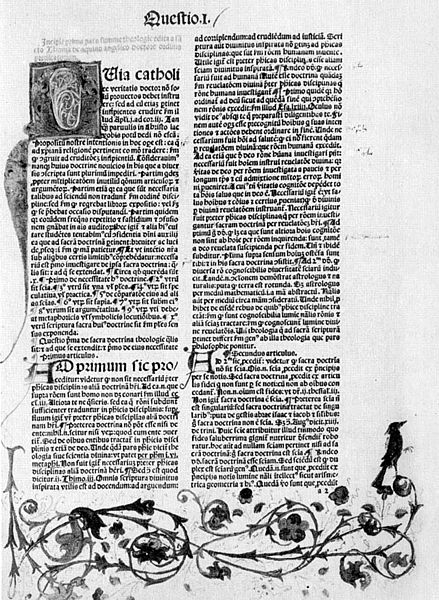 Still reading Scott Hahn and Benjamin Wiker's Answering the New Atheism (Emmaus Road, 2008). They note that three of Thomas Aquinas's proofs of God's existence make exactly the same assumption as the 20th century scientists who inferred that if one played the present state of our universe backward, one would come to a point outside of space or time or the laws of nature - a singularity - and that this point must either be a cause or else have a cause because the universe cannot come from nothing:
Still reading Scott Hahn and Benjamin Wiker's Answering the New Atheism (Emmaus Road, 2008). They note that three of Thomas Aquinas's proofs of God's existence make exactly the same assumption as the 20th century scientists who inferred that if one played the present state of our universe backward, one would come to a point outside of space or time or the laws of nature - a singularity - and that this point must either be a cause or else have a cause because the universe cannot come from nothing: "Since we see that everything in nature is contingent (St. Thomas's third proof), then something non-contingent will ultimately have to ground the contingent," is the same kind of reasoning as "Since the universe is expanding, then it must have arisen from an infinitely dense 'point'" (p. 69)Richard Dawkins attacks Thomas's proofs of God, they say, without seeming to understand the underlying point, that nature must have a cause that lies outside it. They conclude,
If St. Thomas is wrong in using this kind of proof, then Dawkins must likewise reject the kind of reasoning that led to the revelation of the Big Bang. In each case, because of the way nature is, we find that we must have a "terminator" (to use Dawkins' inapt word), something that is other than nature as we know it, and that exists as a cause of nature as we know it. Furthermore, St. Thomas adds, in each of the proofs, something like, "This all men speak of as God," and not "This is God." The reason for this is important: there is asignificant difference between knowing that there must be such a cause, and identifying who or what the cause is. (p. 69)But let's keep in mind here that the Big Bang was a very unpopular theory with atheists and was accepted only under duress ...
See also: Chance - you mean, it isn't really a "thing"?
(Note: The image of the opening of Aquinas's great work, Summa Theologiae, is from Wikimedia Commons.)

